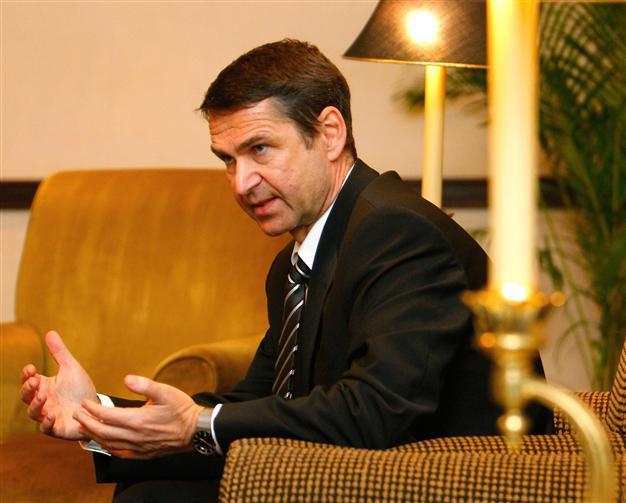FIFA calls for strict match-fixing laws
KUALA LUMPUR - Agence France-Presse

FIFA's security director Ralf Mutschke. AP photo
Football authorities vowed Wednesday to excise the "cancer" of match-fixing but said tougher laws were needed worldwide to smash criminal syndicates responsible for throwing hundreds of matches.
FIFA's director of security Ralf Mutschke told a two-day gathering with Interpol that the world governing body's "zero tolerance" for match-fixing must be buttressed by "the right policies for law enforcement and the football community".
The meeting comes on the heels of revelations a fortnight ago that almost 700 matches worldwide, including Champions League ties and World Cup qualifiers, were targeted by gambling gangs.
"We are banning players and referees for life but criminals are out there free -- they get no sentence. That's wrong," Mutschke told reporters when asked to comment on Singapore's refusal to arrest a key suspect wanted in Italy and suspected of rigging games.
"We have to bring in governments to change legislation and laws. Many countries do not have laws to fight match manipulation," Mutschke said.
He pointed to the November acquittal of three players in Switzerland accused of committing fraud by throwing games, where a judge said there was no obvious victim.
Mutschke said FIFA was cooperating with the Council of Europe to draft legislation to fight match-fixing, with hopes it would be implemented across the continent.
FIFA's legal team will also press the case at a May meeting of national sports ministers in Berlin where match-fixing is due to be discussed, he added.
About 150 delegates from Asian football associations, player and referee representatives, as well as government agencies, are meeting in the Malaysian capital of Kuala Lumpur, home to the Asian Football Confederation (AFC).
"We are ready to work hand-in-hand to eradicate this cancer from the game. AFC will not rest until this plague is completely stamped out in Asia," the AFC's acting president Zhang Jilong said in a speech.
But he later admitted to AFP that eradication "could be difficult, especially in Asia", where gambling is widespread and flourishing.
Peter Velappan, who was AFC general-secretary for 30 years until 2007 and is now retired, told AFP that football authorities also must press for strict punishments in any legislation aimed at match-fixing.
"This move to criminalise it is exactly what is needed but it must be clear and hard from the start to be a good example," said Velappan, who had earlier called the recent match-fixing revelations "the tip of the iceberg." According to the European police agency Europol, 380 suspicious match results have been identified in Europe, among nearly 700 worldwide, with the problem tied to a criminal syndicate based in Singapore.
Police in Singapore are calling for hard evidence before acting against Dan Tan Seet Eng, a Singaporean citizen whose name has cropped up in probes across several countries.
Asked by reporters whether FIFA might initiate any sanctions against Singapore football over the situation, Mutschke ruled that out, saying Singapore's football should not be "punished for a political problem".
He also said that "to the best of our knowledge," FIFA's flagship World Cup tournament, the finals of which will be held in Brazil next year, has not been infiltrated by organised crime.
